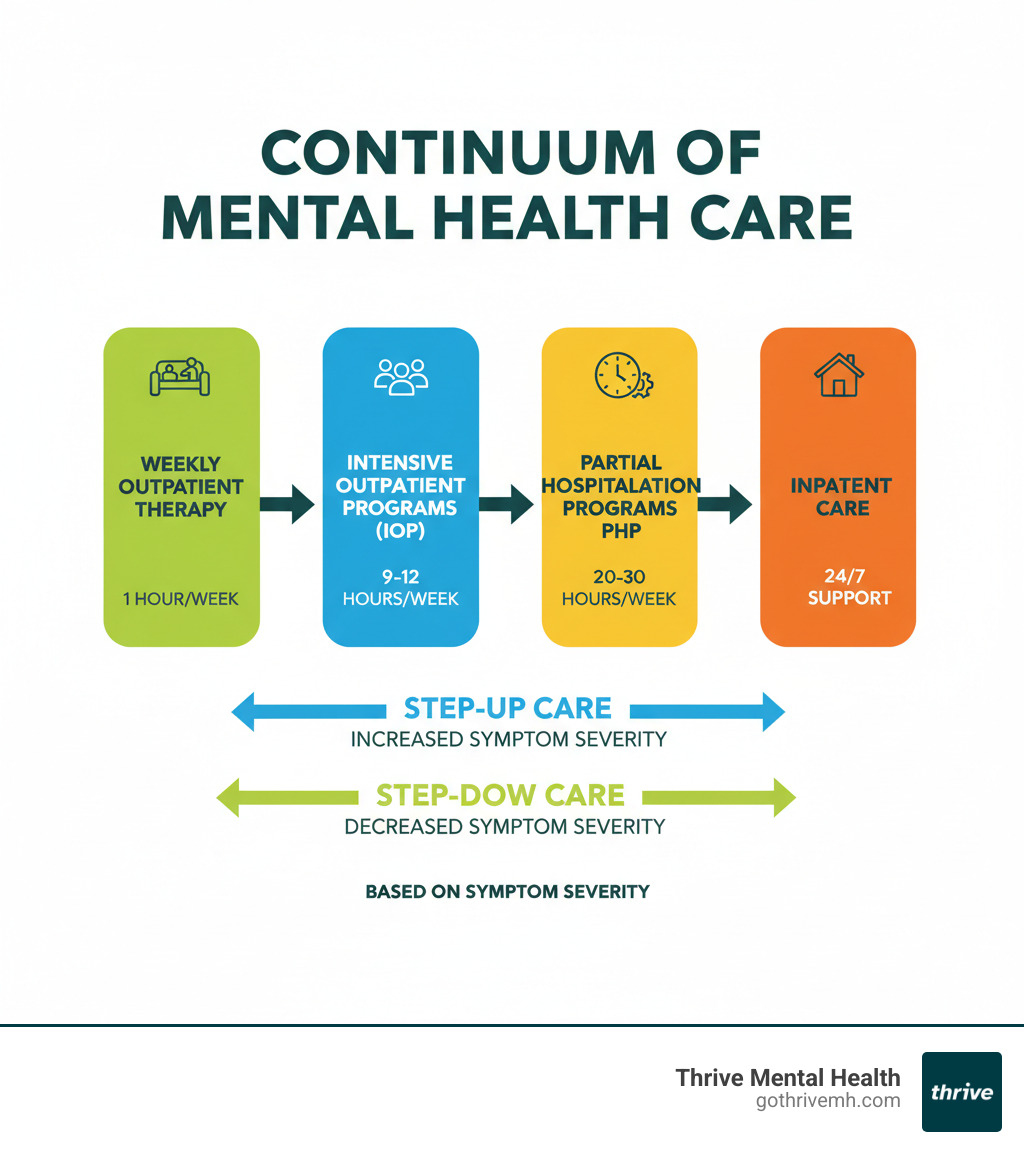Tampa’s Top Spots for Outpatient Mental Health Care

Outpatient mental health Tampa: Essential Healing 2025
Your First Step to Feeling Better in Tampa
Outpatient mental health Tampa offers flexible, professional treatment that lets you heal while maintaining your daily life. Unlike inpatient care, outpatient programs allow you to live at home, keep working, and apply new coping skills in real-world situations.
Quick Guide to Tampa Outpatient Mental Health Options:
- Traditional Outpatient Therapy: Weekly 1-hour sessions with a therapist
- Intensive Outpatient Program (IOP): 9-12 hours per week, includes group and individual therapy
- Partial Hospitalization Program (PHP): 20-30 hours per week, most intensive outpatient option
- Virtual Care: Access treatment from home with flexible scheduling
In Florida, 648,000 adults live with serious mental illness, making accessible outpatient care more critical than ever. The Tampa Bay area offers diverse treatment options, from traditional weekly therapy to intensive programs that provide structured support without requiring hospitalization. Finding the right provider, whether in-person or a flexible virtual option, is a key first step.
I’m Anna Green, LMHC, LPC, Chief Clinical Officer and founder of Thrive Mental Health, where we’ve helped countless Florida residents in Tampa and beyond access flexible outpatient care through our virtual IOP and PHP programs. My experience leading clinical strategy at major treatment centers has shown me how outpatient mental health Tampa services can transform lives when they’re accessible, evidence-based, and designed around your schedule.

Handy Outpatient mental health Tampa terms:
Understanding Outpatient vs. Inpatient Treatment
When you’re facing mental health challenges, understanding your treatment options can feel overwhelming. The main choice you’ll encounter is between outpatient and inpatient care—and knowing the difference can help you find the right path forward.
Inpatient care means staying at a treatment facility 24/7, with round-the-clock supervision and support. This level of care becomes necessary during crisis situations—when someone is at risk of harming themselves or others, or when symptoms are so severe that daily functioning becomes impossible. Think of it as hitting the pause button on life to focus entirely on stabilization and healing.
Outpatient mental health Tampa programs offer a completely different approach. You receive professional, structured treatment while continuing to live at home and maintain your daily routine. This means you can keep working, stay in school, and remain connected to your family and friends throughout your healing journey.
The flexibility of outpatient care is genuinely life-changing. Instead of putting your entire life on hold, you attend therapy sessions for a set number of hours each week—whether that’s 3 hours for traditional therapy or 12 hours for intensive programs. You’re living at home, sleeping in your own bed, and maintaining work and school commitments that matter to you. With virtual options, this flexibility extends across the entire state of Florida, making quality care accessible no matter where you live.
What makes outpatient care particularly powerful is the real-world skill application. Every coping strategy you learn in therapy gets tested immediately in your actual environment. Had a tough session about managing anxiety? You get to practice those techniques at your job the next day. This immediate application makes the skills stick in ways that residential treatment simply can’t match.
The cost-effectiveness is another major advantage. Without the expense of room, board, and 24-hour staffing, outpatient programs typically cost significantly less than inpatient care. Most insurance plans also provide better coverage for outpatient services, making professional help more accessible when you need it.
Outpatient mental health Tampa services provide that sweet spot of structured support without the intensity of residential care. You get evidence-based therapy, peer support, and professional guidance—all while building a sustainable support system within your existing life.
For many people, this balance of professional treatment and personal freedom creates the ideal healing environment. You’re not just learning to cope in a controlled setting; you’re building real-world resilience that lasts long after treatment ends.
To dive deeper into how this approach can transform your mental health journey, check out our comprehensive guide on Understanding the Benefits of an Outpatient Program.
Levels of Care: Decoding PHP and IOP in Tampa
When weekly therapy isn’t quite enough but you don’t need round-the-clock care, outpatient mental health Tampa offers two powerful middle-ground options: Partial Hospitalization Programs (PHP) and Intensive Outpatient Programs (IOP). Think of these as your safety net – more support than traditional therapy, but flexible enough to keep your life moving forward.
Partial Hospitalization Program (PHP)
A Partial Hospitalization Program (PHP) is like having a full day of intensive treatment while still sleeping in your own bed. It’s the most robust form of outpatient care available, typically requiring 20-30 hours per week spread across five days. You might attend from morning until late afternoon, then head home to practice what you’ve learned.
PHP often serves as a gentle bridge. Maybe you’re stepping down from inpatient care and need continued intensive support. Or perhaps your symptoms have intensified to the point where weekly therapy feels like trying to fill a swimming pool with a garden hose – you need more. Our PHP Program is designed exactly for these moments when you need comprehensive care without losing your independence.
The beauty of PHP lies in its comprehensive approach. You’ll experience group therapy, individual sessions, medication management, and skill-building activities all woven together in a structured day. It’s intensive, yes, but it’s also incredibly effective for stabilization and building a solid foundation for recovery.
Intensive Outpatient Program (IOP)
An Intensive Outpatient Program (IOP) offers a sweet spot of flexibility and support. With 9-12 hours per week, typically spread across three to five days, IOP gives you substantial therapeutic support while preserving time for work, school, or family responsibilities.
Many people find IOP perfect when they’re stepping down from PHP or when traditional weekly therapy isn’t providing enough structure. It’s also ideal if you’re dealing with moderate symptoms that need consistent attention but don’t require full-day intervention. Our Intensive Outpatient Programs focus on helping you apply new coping skills in real-world situations while maintaining the support network you need.
The magic of IOP happens in its balance of group and individual work. You’ll connect with others facing similar challenges while also receiving personalized attention. It’s like having a therapeutic community that understands your journey while respecting your need to maintain your daily life.
| Feature | Partial Hospitalization Program (PHP) | Intensive Outpatient Program (IOP) |
|---|---|---|
| Hours per Week | 20-30 hours (typically 5 days, 4-6 hours daily) | 9-12 hours (typically 3-5 days, 3 hours daily) |
| Typical Duration | 2-4 weeks | 6-12 weeks |
| Ideal Candidate | High symptom severity, stepping down from inpatient, risk of hospitalization | Moderate symptoms, stepping down from PHP, needs more than weekly therapy |
| Primary Goal | Rapid stabilization and intensive skill-building | Skill application and sustainable recovery practices |
Both programs share a common thread: they meet you where you are while gently pushing you toward where you want to be. Whether you need the intensive daily structure of PHP or the balanced approach of IOP, the goal is the same – building lasting skills for mental wellness while keeping you connected to your life outside treatment.
Understanding these options can feel overwhelming, but that’s exactly why we created our detailed comparison guide on PHP vs IOP. It walks you through the decision-making process, helping you identify which level of care aligns best with your current needs and life circumstances, whether you’re seeking care in Tampa or from anywhere else in Florida.
Common Conditions & Therapies in Tampa Outpatient Programs
Tampa’s outpatient mental health landscape offers hope for a wide range of struggles, and the good news is that you don’t have to face them alone. Whether you’re dealing with daily anxiety that makes work feel impossible, depression that’s stolen your joy, or trauma that keeps replaying in your mind, outpatient mental health Tampa programs are designed to meet you where you are.
What Conditions Can Be Treated?
The beauty of outpatient care is its versatility. At Thrive Mental Health, we’ve seen incredible changes in people dealing with various mental health challenges, and Tampa’s broader mental health community offers similar comprehensive support.
Depression often feels like a heavy blanket you can’t shake off. Whether you’re experiencing major depressive disorder, seasonal depression, or postpartum struggles, outpatient programs help you refind energy and hope. Anxiety disorders – from the constant worry of generalized anxiety to the sudden terror of panic attacks – respond beautifully to structured outpatient care that teaches you practical tools for racing thoughts and restlessness.
Trauma and PTSD require special care, and Tampa’s outpatient programs offer specialized therapies that help you process difficult experiences safely. Bipolar disorder brings its own unique challenges with mood swings and episodes, but outpatient treatment provides the stability and skills needed to manage these fluctuations effectively.
For those dealing with OCD, outpatient programs use specific approaches like Exposure and Response Prevention to help break the cycle of obsessions and compulsions. Many people also struggle with co-occurring substance use disorders alongside mental health conditions – what professionals call dual diagnosis treatment. These programs address both the mental health symptoms and substance use patterns together.
The scope extends to eating disorders, personality disorders, and even psychotic disorders, with each requiring specialized approaches within the outpatient framework. For adults specifically seeking this level of care, our Adult Outpatient Mental Health programs focus on the unique challenges faced in adulthood.
What Therapeutic Approaches Are Used?
The magic happens through evidence-based therapies that actually work. Think of these approaches as different tools in a toolkit – your treatment team selects the right combination for your specific situation.

Cognitive Behavioral Therapy (CBT) forms the backbone of many programs. It’s like learning to be your own detective, identifying those sneaky negative thought patterns and replacing them with healthier alternatives. CBT gives you practical tools you can use immediately – whether you’re catastrophizing about a work presentation or spiraling into “what if” thinking.
Dialectical Behavior Therapy (DBT) takes a different approach, focusing on four core skills: mindfulness, distress tolerance, emotion regulation, and interpersonal effectiveness. If you’ve ever felt like your emotions control you instead of the other way around, DBT teaches you how to surf those waves instead of being swept away by them.
Group therapy might feel intimidating at first, but it often becomes the highlight of treatment. There’s something powerful about sitting in a room (or virtual space) with people who truly understand your struggles. You’ll practice new social skills, gain fresh perspectives, and realize you’re not alone in this journey. Our virtual group sessions create the same supportive environment from the comfort of your home.
Individual therapy provides that crucial one-on-one space where you can dive deep into personal issues, work through specific challenges, and develop strategies custom just for you. Combined with medication management when appropriate, these sessions ensure your treatment plan evolves with your needs.
The focus on psychoeducation and relapse prevention means you’re not just learning to feel better temporarily – you’re building a foundation for long-term wellness. You’ll understand your condition better, recognize early warning signs, and develop a toolkit of strategies for managing stress and preventing setbacks.
Whether you’re looking for in-person care in Tampa or prefer the flexibility of virtual treatment from anywhere in Florida, our Virtual Intensive Outpatient Programs ensure you receive the same high-quality, evidence-based care that supports your unique path to healing.
Your Guide to Finding & Paying for Outpatient Mental Health Tampa
Finding the right mental health support in Tampa doesn’t have to feel overwhelming. With the right approach, you can steer both the selection process and the financial aspects with confidence. Let me walk you through what matters most when choosing a provider and understanding your insurance options.
How to Choose the Right Provider for Outpatient Mental Health Tampa
Choosing the right outpatient mental health Tampa provider is one of the most important decisions you’ll make on your healing journey. It’s about finding a team that truly understands your needs and can support you effectively.
The process typically starts with an initial assessment. This comprehensive evaluation helps both you and the provider understand if you’re a good fit for each other. Expect thoughtful questions about your mental health history, current symptoms, treatment goals, and what you’re hoping to achieve. This isn’t just paperwork—it’s the foundation of your personalized care plan.
Checking credentials might sound boring, but it’s actually your peace of mind guarantee. Look for providers with proper licensing and accreditation from recognized organizations. The Joint Commission’s Gold Seal of Approval, for instance, signals that a facility meets rigorous national standards for safety and quality in behavioral health care. Learn about The Joint Commission’s Gold Seal of Approval to understand what this accreditation means for your care.
The provider’s treatment philosophy should align with what feels right for you. Do they emphasize evidence-based therapies like CBT and DBT? Do they take a holistic, whole-person approach? Are treatment plans truly individualized, or do they use a one-size-fits-all model? These details make a huge difference in how effective your treatment will be.
Consider whether virtual or in-person care works better for your lifestyle. While many Tampa providers offer traditional in-person programs, virtual options provide incredible flexibility. You can access expert care from your home, whether you’re in Tampa, St. Petersburg, or anywhere else in Florida—or even in other states where virtual programs operate.
Finally, think about program structure and any specialized needs you might have. Understand the time commitment for IOP versus PHP programs. If you have specific concerns—like co-occurring substance use, trauma, or work-life balance issues—make sure the provider has experience and specialized programs in those areas.
Trust your instincts during this process. The right provider will make you feel heard, respected, and hopeful about your path forward.
Navigating Insurance for Outpatient Mental Health Tampa
Understanding insurance coverage for mental health services can feel like learning a foreign language, but it doesn’t have to be complicated. Let’s break it down into manageable pieces.

Verifying your benefits is your first and most important step. Most quality providers offer free insurance verification services—take advantage of this. You’ll learn about your coverage percentage, co-pays, deductibles, and out-of-pocket maximums. This information helps you budget and removes financial surprises later.
The difference between in-network and out-of-network providers significantly impacts your costs. In-network providers have contracts with your insurance company, which typically means lower out-of-pocket expenses for you. Many Tampa-area providers work with major insurers like Florida Blue (BCBS), Optum, Cigna, and Tricare. Out-of-network providers might still be covered partially by your insurance, but you’ll usually pay a higher percentage of the costs.
Virtual care has revolutionized insurance coverage for mental health services. Most major insurance plans now cover virtual IOP and PHP programs, making quality care accessible regardless of your physical location. This is particularly valuable if you’re in Florida or other states where virtual programs operate. Our Virtual IOP South Florida guide provides more details about how virtual care works with insurance coverage.
Don’t hesitate to contact your insurance provider directly with questions. Many also have online portals where you can check your benefits and find in-network providers. Investing time in understanding your coverage upfront allows you to focus entirely on your healing journey without financial stress weighing you down.
The goal is to make quality mental health care accessible and affordable. With the right information and support, you can steer these systems successfully and get the help you deserve.
Frequently Asked Questions about Outpatient Care in Tampa
When you’re considering outpatient mental health Tampa services, it’s completely normal to have questions. We’ve been helping people steer these decisions for years, and these are the questions that come up most often in our conversations with individuals and families seeking support.
What is the main difference between regular outpatient therapy and an IOP?
Think of traditional therapy as your weekly check-in—usually one hour per week with your therapist to work through challenges and maintain your mental health. It’s perfect for ongoing support and managing day-to-day stressors.
An Intensive Outpatient Program (IOP), on the other hand, is like having a dedicated support team when you need more help. You’ll attend multiple therapy sessions each week, combining both group and individual work. Instead of that single weekly hour, you might spend 9-12 hours per week in structured treatment.
The key difference is intensity and structure. If you’re struggling to manage symptoms with weekly therapy alone, or if you’re stepping down from a higher level of care like inpatient treatment, an Intensive Outpatient Program (IOP) provides that crucial middle ground. You get comprehensive support without needing to be in a facility 24/7.
How long do outpatient programs like IOP or PHP usually last?
Here’s what we typically see, though remember that everyone’s journey is unique. Partial Hospitalization Programs (PHP) are the most intensive outpatient option, usually lasting several weeks—often around 2-4 weeks. Think of PHP as intensive stabilization when you need significant daily support.
Intensive Outpatient Programs (IOP) generally run longer, typically 6-12 weeks. This gives you time to not only learn new coping skills but actually practice them in your daily life. The beauty of IOP is that you’re applying what you learn in real-time—at work, at home, with family and friends.
Your treatment team will regularly check in with you to see how you’re progressing. Some people find they’re ready to step down to weekly therapy sooner, while others benefit from staying in the program a bit longer. The goal is always to make sure you feel confident and equipped with the tools you need for long-term success.
Can I keep my job while attending an outpatient mental health program?
Absolutely—and this is one of the biggest advantages of choosing outpatient care. We designed our programs specifically with working adults and young professionals in mind because we know you can’t just put your life on hold to get better.
Many outpatient mental health Tampa providers, including our virtual and hybrid programs, offer evening sessions precisely for this reason. You might attend group therapy from 6-9 PM on weekdays, or join virtual sessions during your lunch break. This flexibility is key, as our virtual programs allow you to get help from anywhere in Florida without putting your life on hold.
You’re not just learning coping skills in isolation—you’re practicing them in real-world situations. That presentation at work becomes an opportunity to use your new anxiety management techniques. Family dinner becomes a chance to practice the communication skills you learned in group therapy.
Some people do need to make temporary adjustments to their schedule, like reducing hours or working from home more often during treatment. But the vast majority of our clients successfully balance their professional commitments with their mental health care. It’s about finding what works for your specific situation.
Note: For optimal search engine visibility, we recommend implementing JSON-LD FAQ schema markup for the above questions and answers.
Ready to Start Your Healing Journey?
Taking the first step toward mental health support can feel overwhelming, but you’ve already shown incredible courage by researching your options. If you’re ready to move from feeling stuck to feeling hopeful, outpatient mental health Tampa services through Thrive Mental Health offer a path forward that honors both your need for healing and your daily responsibilities.
We understand that your life doesn’t pause for treatment—you have work deadlines, family commitments, and a routine that keeps you grounded. That’s exactly why our virtual and hybrid IOP/PHP programs, accessible to residents across Florida, are designed with flexibility at their core. Whether you’re dealing with anxiety that makes leaving home challenging, depression that saps your energy, or trauma that requires gentle, consistent care, our evening sessions mean you can access expert-led treatment without disrupting your entire schedule.
What makes our approach different? We believe healing happens best when treatment fits your life, not the other way around. Our evidence-based programs combine the structure you need with the convenience you deserve. You’ll work with licensed clinicians who understand that recovery isn’t one-size-fits-all, and you’ll connect with peers who truly get what you’re going through.
The insurance piece doesn’t have to be another source of stress. Most of our clients are surprised to find how much their insurance covers for intensive outpatient care. Our team handles the verification process for you—no lengthy phone calls or confusing benefit explanations. You’ll know exactly what to expect financially before you commit to anything.
Ready for support? Thrive Mental Health offers virtual and hybrid IOP/PHP with evening options. Verify your insurance in 2 minutes (no obligation) → Start your journey with our Intensive Outpatient Programs or call 561-203-6085. If you’re in crisis, call/text 988.
If you’re in crisis, call/text 988 right now. You are not alone.